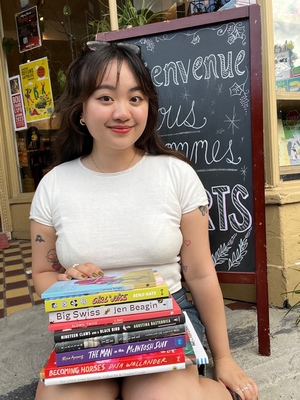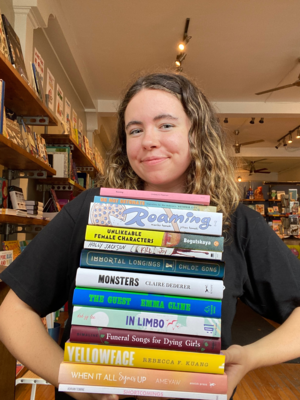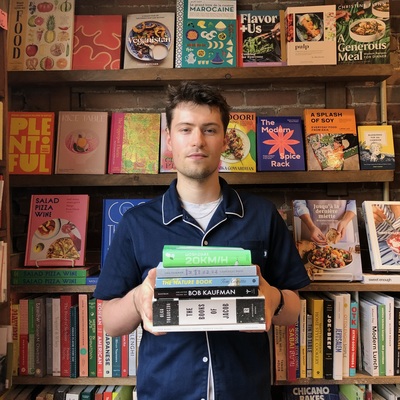This Shelf Belongs To ... Billy-Ray Belcourt
September 2, 2019

Each month, Librairie Drawn & Quarterly invites an author or artist to curate a shelf in the store. This September, we bring you recommendations from Billy-Ray Belcourt!

BILLY-RAY BELCOURT (he/him) is a writer and academic from the Driftpile Cree Nation. His debut book of poems, This Wound is a World, won the 2018 Griffin Poetry Prize and the 2018 Robert Kroetsch City of Edmonton Book Prize, and was named the Most Significant Book of Poetry in English by an Emerging Indigenous Writer at the 2018 Indigenous Voices Award. It was also a finalist for the Governor General’s Literary Award, the Gerald Lampert Memorial Award, and the Raymond Souster Award. It was named by CBC Books as one of the best Canadian poetry collections of the year. Billy-Ray is a Ph.D. student and a 2018 Pierre Elliott Trudeau Foundation Scholar in the Department of English and Film Studies at the University of Alberta. He is also a 2016 Rhodes Scholar and holds a Master’s degree in Women’s Studies from Wadham College at the University of Oxford.
Belcourt's second book NDN Coping Mechanisms: Notes from the Field is officially out this Month, and (unsurprisingly) is an immediate bestseller! NDN Coping Mechanisms was officially launched in Montreal on Monday September 9th!
All of Billy-Ray's picks will be 15% off for the month of September. Here’s a sneak peek of what you’ll find:
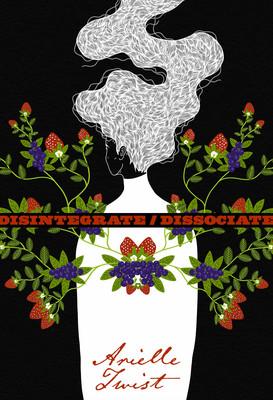
Disintegrate/Dissociate
Arielle Twist
In her powerful debut collection of poetry, Arielle Twist unravels the complexities of human relationships after death and metamorphosis. In these spare yet powerful...
More InfoArielle Twist’s DISINTEGRATE/DISSOCIATE
Here is a record of a life as it is lived in its wondrous and heartbreaking entirety. What Arielle Twist has pulled off in this book is neither a catastrophization nor a romanticization of trans Indigenous womanhood, but rather an uncompromised portrait of what it is to long for, to fight for, and to refuse to be denied freedom. DISINTEGRATE/DISSOCIATE asks us, those of us who do not live at the precarious intersection of gender, race, class, and sexuality, to be witness, to document, to listen deeply and with empathy; it also implicates, accuses, demands, instructs. In one poem, Twist writes: “if this body / is up for grabs / under scrutiny / fill it with flowers.” In another: “plant seeds / in emptiness / and hope that / something grows.” The poems say: here is the story of my living, be and make something beautiful with it!
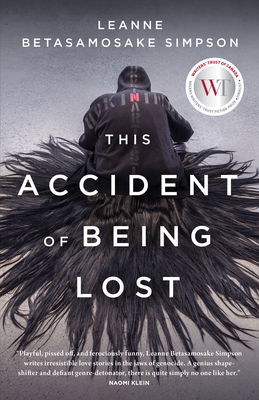
This Accident of Being Lost
Leanne Betasamosake Simpson
2017 Rogers Writers’ Trust Fiction Prize FinalistThis Accident of Being Lost is the knife-sharp new collection of stories and songs from award-winning Nishnaabeg storyteller...
More InfoLeanne Betasamosake Simpson’s THIS ACCIDENT OF BEING LOST
“this is how to die in a war / they insist doesn’t exist.” So goes Leanne Betasamosake Simpson in a poem called “Road Salt” in THIS ACCIDENT OF BEING LOST. These lines, as does all of Leanne’s work, brings into focus the noise of conquest and settlement as they continue to brutalize Indigenous peoples from coast-to-coast-to-coast. The book, however, also bears a theory of freedom, one that uncovers how Indigenous peoples already practice a futurity that contests Canada as such. Simpson upsets genre and expertly blends wit, critique, and lyricism to dance “a new world into reality."

Assi Manifesto
Natasha Kanapè Fontaine
Assi Manifesto is a celebration of the Innu land in the tradition of Joséphine Bacon. This telluric power is reminiscent of Paul Chamberland?s Terre...
More InfoIn ASSI MANIFESTO (translated from the French by Howard Scott), Natasha Kanapé Fontaine writes with lyrical heft about her people, the Innu, and the spoils of colonialism. I was most exhilarated by her aesthetics of protest, of revenge, her refusal to entertain easy solutions for a tragedy as old as the country. Upon reading the book, I knew I had to acquire her catalog of books in its entirety.

Mourning Diary
Roland Barthes
"In the sentence ‘She's no longer suffering,' to what, to whom does ‘she' refer? What does that present tense mean?" —Roland Barthes, from his...
More InfoAs is stated in the book’s paratext, Roland Barthes’s MOURNING DIARY is a “hypothesis of a book desired,” and it is this unfinished quality, this romance with the ephemeral and fragmentary, that lends the project its allure and aesthetic rarity. Barthes writes with his signature drama in the wake of his mother’s death and, in so doing, remaps the terrains of mourning and melancholy. It is a book I revisit often, among the few I imagine I will carry around for the rest of my life.

Prison Industrial Complex Explodes
Mercedes Eng
Combining text from government questionnaires and reports, lyric poetry, and photography, Prison Industrial Complex Explodes examines the possibility of a privatized prison system in...
More Info In PRISON INDUSTRIAL COMPLEX EXPLODES, Mercedes Eng shows what it is to take on a mode of embodiment that is in contradistinction to the police and thus singled out to be corrected by the police. It is out of the experience of being mired in the singularity of incarceration (an imprisoned father) that Eng aims an unflinching sociological eye at the many-headed hydra of carceral power. To read this book is to bear witness to Eng’s fast mind at work as she tours the reader through the social laboratories of the New World - the plantation - to the archives of colonial law to the affect world of an individual family in western Canada. Eng wields the language of the state against itself, gathering police documents, government surveys and notices, and press releases, all of which have the effect of demystifying the haze of normalcy that shrouds official speech. PRISON INDUSTRIAL COMPLEX, then, puts to use a poetry that is revolutionary and in so doing argues that the structures of unfreedom that harm some more than others should always be the target of contemporary literature.
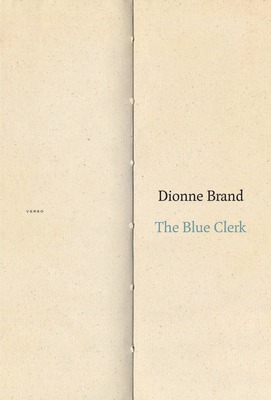
The Blue Clerk
Dionne Brand
Dionne Brand, author of the Griffin Poetry Prize-winning collection Ossuaries, returns with a startlingly original work about the act of writing itself.On a lonely...
More InfoThis is a rare book, in that it dares to invent its own context, to demand a reading practice only it can teach. THE BLUE CLERK defies aesthetic norms to operationalize a “poetry… [that] has no obligation to the present,” one capacious enough to dispute the literary history out of and in opposition to which it rebelliously emerges. In this sense, Brand’s THE BLUE CLERK feels to me to be a kind of artifact of the future, something before its time, in that it is against its time, against time writ large. To read it is to experience oneself stepping out of rhythm with the dully possible. Brand writes, “I walked into a paragraph a long time ago and never emerged from it.” How lucky we all are to lose ourselves in the paragraphs of Dionne Brand!

Where Reasons End
Yiyun Li
A fearless writer confronts grief and transforms it into art, in a book of surprising beauty and love. The narrator of Where Reasons End...
More InfoYiyun Li sculpts a dimension governed not by time or space but sentiment to offer up one of the most humane and empathetic accounts of suicide and its aftermath that I’ve encountered. WHERE REASONS END stages its narrative at the fraught schism at which motherhood and childhood become asynchronous, and it is there that Li’s wisdom shimmers and devastates. Here’s a glimpse of the kinds of captivating sentences she conjures: “What, my child, can I catch now, when all has become invisible? / Words, mother dear, Nikolai said. We will be catching each other’s words, don’t you see?"
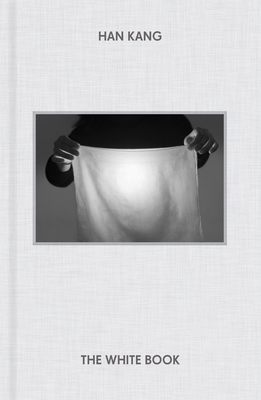
The White Book
Han Kang
From the winner of the Man Booker International Prize for The Vegetarian comes a stunning meditation on the colour white; about light, about death...
More InfoTHE WHITE BOOK (translated from the Korean by Deborah Smith) is a heart-rending and ceaselessly smart work of fiction that remakes the genre so that it mirrors poetry’s emphasis on the sentence and the image as key units of meaning-making. Structurally, it is a catalog of white things, but Han Kang breaches the mundanity of list-making to demonstrate that the color is entangled with grief, with memory and how we understand ourselves as inheritors of painful pasts. Over and over I was winded by passages such as “A woman on the second floor was hanging her washing out over the balcony rail when a handful of items slipped from her grasp. A single handkerchief drifted down, slowest of all, finally to the ground. Like a bird with its wings half furled. Like a soul tentatively sounding out a place it might alight." Since reading it last year, the book has stayed in my orbit.
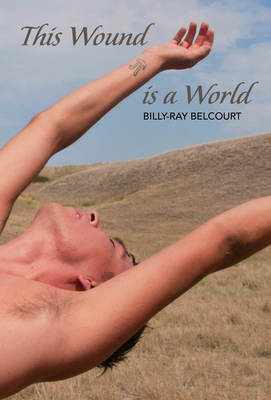
This Wound is a World
Billy-Ray Belcourt
This Wound is a World slip-slides between poetry and essay to get at the shaky tempos of Indigenous life in a world bent on...
More Info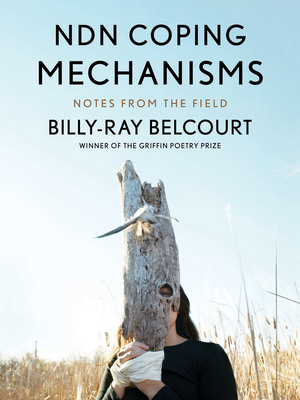
NDN Coping Mechanisms
Billy-Ray Belcourt
In the follow-up to his Griffin Poetry Prize–winning collection, This Wound is a World, Billy-Ray Belcourt aims more of an anthropological eye at the...
More Info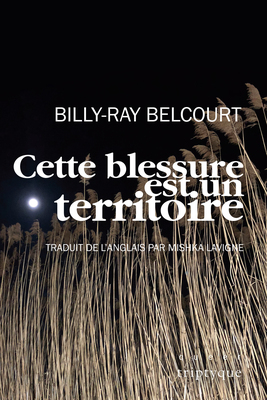
Cette blessure est un territoire
Billy-Ray Belcourt
On peut imaginer que Billy-Ray Belcourt entend la poésie comme Audre Lorde la concevait, c’est-à-dire comme une « distillation révélatoire de l’expérience », une exploration honnête...
More Info